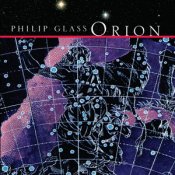Later I got a recording of Akhnaten, which I thought was interesting but didn’t do much for me. Then I saw Glass and his Ensemble in performance, but curiously, it must not have made much of an impression, because I can’t tell you now what they played or even where I saw the performance. I do remember the premiere of his chamber opera The Fall of the House of Usher, which the time I thought was one of the worst things I’d ever seen or heard.
Then a couple years ago I saw The Hours—fortunately on DVD, not at the local multiplex, because I was an emotional wreck at the end. I found Glass’s score breathtakingly moving (though reportedly studio boss Harvey Weinstein hated it). I also was excited by his score for The Truman Show, which was well-suited to that parable of celebrity. Perhaps here’s the place to add that I did a telephone interview with Glass one time. He was a very nice fellow and gave thoughtful answers to some of my questions (mainly about his compositional process) that I knew wouldn’t interest my readers, or even make it into the final review.
So, I hadn’t heard much Glass in a while, apart from The Hours, and I was curious what this new piece Orion was all about. It was commissioned for the Olympics in Athens and premiered there in June 2004. The movements cover the continents: Australia, China, Canada, The Gambia, Brazil, India, and Greece (no march of the penguins to represent Antarctica), with three short interludes. Glass recruited regional musicians to collaborate with him on the various movements. The program insert describes them as composer/performers, but we don’t get any clue as to how much of the music they composed, or whether they merely guided Glass in composing for their instruments. The title Orion refers to the constellation, which can be seen from both hemispheres.
The opening movement, Australia, features Mark Atkins, who plays the didgeridoo. The didgeridoo is a type of cylindrical hardwood drone pipe, played by the native peoples of Australia. You get one note, which can be sustained for as long as 40 minutes using “circular breathing”: players inhale through their nose while they exhale into the didgeridoo using their cheeks and tongue. Here the drone gives Glass’s opening a kind of Also sprach Zarathustra/2001–Rheingold feel. It also caught my akita’s ear, who kept looking at the speakers.
The “China” movement showcases Wu Man on the more familiar pipa, a four-stringed, pear-shaped lute. Also an ancient instrument like the didgeridoo, the pipa allows Glass a little more “melodic” flexibility. But, what, one might ask, could Glass find to characterize Canada? A good Irish violin (= Irish immigrants). I might have suggested some French dances, but platinum-selling violinist Ashley MacIsaac can certainly get your toes to tapping.
Foday Musa Suso, a griot in the West African Mandigo culture, plays the kora in the “Gambia” section. The kora is another harp-lute, and another instrument of ancient origins. You’d probably recognize it if you saw it: it has a large hemispherical body with a long neck and two planes with 11 and 10 strings running in notches at the sides of an upright bridge. “Brazil” features the ensemble UAKTI from that country; their particular niche is using all manner of materials to construct their instruments. The booklet doesn’t tell us what they cobbled together for this performance.
“India” has Gaurav Mazumdar playing the familiar sitar. According to the program notes, it seems that Ravi Shankar had a hand in the composition of this section, though, here again, Glass is being vague about who composed what. All of the artists collaborate in the final section, “Greece,” joined by soprano Eleftheria Arvanitaki in Glass’s arrangement of a traditional song, “Tzivaeri.”
And, so, a reviewer ultimately is required to (or supposed to) give his or her assessment of a performance, however much they try to wiggle out of it by giving lots of background material. Glass’s collaborators give quite accomplished performances, though I’m not qualified to say how good the didgeridoo Johnny-One-Note is. As to Glass, well, as much as I’m always inclined to like his music, this 90 minutes’ worth sounds awfully repetitious. (Yes, thank you, I know that’s a hallmark of minimalism.) Both repeating itself and repeating other compositions of his. It seems almost glib; nothing caught my ear to make me look at the speakers.
Is it art or is it craftsmanship? I’m inclined to nod toward the latter for this score. I was just reading a book on American music in West Germany after World War II; the author reports one observer writing in the 1970s and 1980s that Glass’s music “approached pop music” and that it didn’t have “socially-critical content.” Well, listeners certainly don’t want socially-critical content crammed down their throats at every concert (and the Germans were wild over John Cage; go figure). But I think this is why I like Glass’s film music more than his scores like Orion: his music seems to better suit the pop culture of films, even when they do have socially-critical content, like The Truman Show.
Fans of Glass will want to pick up this set. It’s certainly very listenable, and Glass’s collaborators add a lot to the mix, both in their performances and in their contributions (however much) to the actual composition. Even though this piece didn’t do much for me, I’m looking forward to hearing whatever Glass comes out with next. Maybe I’ll even wag my tail.
David E. Anderson
